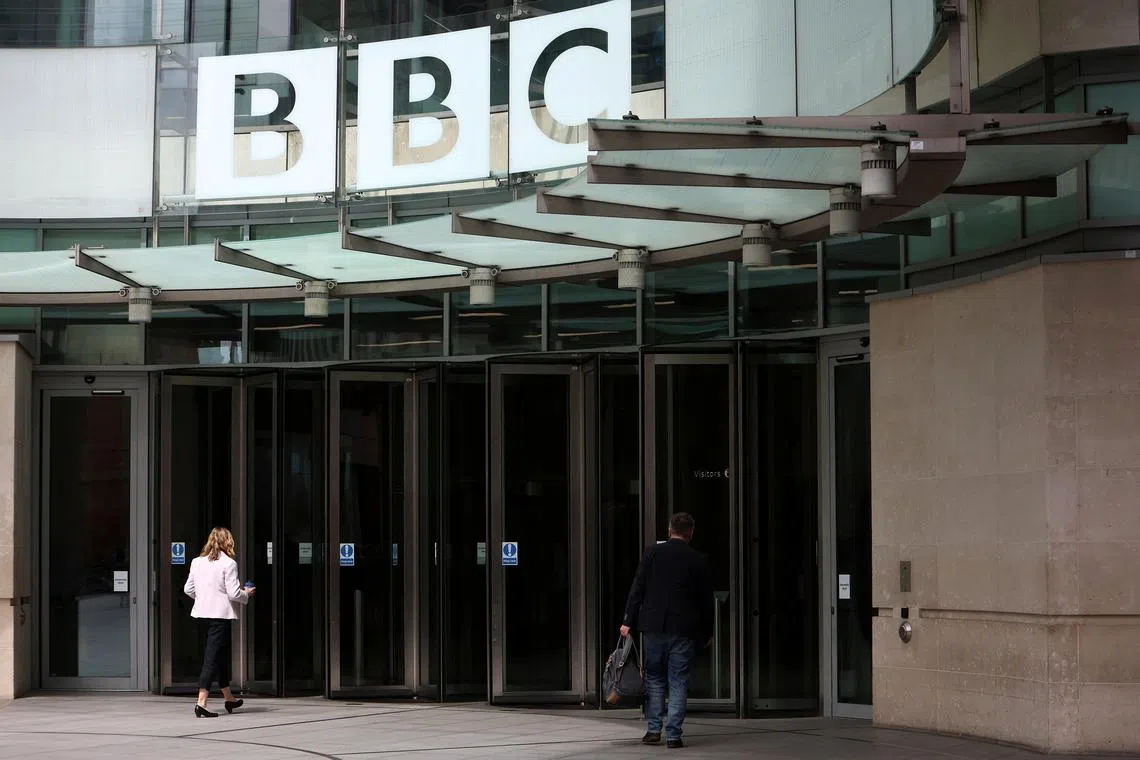BBC radio host issues call for presenter at the centre of scandal to name himself
Sign up now: Get ST's newsletters delivered to your inbox

The BBC's director-general Tim Davie has acknowledged that the lurid allegations had tarnished the reputation of Britain’s public broadcaster.
PHOTO: REUTERS
Follow topic:
LONDON – A BBC radio host on Wednesday called for the presenter at the British broadcaster at the centre of an ongoing scandal to name himself.
The unnamed male staff member has been facing allegations of paying tens of thousands of pounds to a teenager in exchange for sexually explicit photographs.
“It’s his decision, but he needs to come forward now,” radio host Jeremy Vine said.
Mr Vine said the presenter’s “survival instinct has kicked in”, but he needs to acknowledge the damage the scandal has inflicted on the BBC and his friends.
He said the presenter’s name not being public could risk other BBC presenters’ safety, the broadcaster said.
“The idea that he could just remain anonymous forever, and then walk back into the building with his ID pass? Oh no, that’s not going to happen,” Mr Vine said.
Some BBC listeners felt otherwise, however, with one member of the public saying the media’s coverage of the story being “more about the headlines than the truth”.
He said the presenter deserves anonymity until he is charged because “there’s been no criminal wrongdoing or anything yet here”, according to a report by the BBC.
A criminologist who spoke to the broadcaster shared similar sentiments, saying more clarity and transparency is needed about both sides of the story before deciding whether or not the identity of the presenter should be made public.
The crisis deepened on Tuesday with a report that a second person had come forward with allegations that the presenter had sent angry and abusive messages to the person via a dating app.
The BBC reported that the young person, whom it did not identify, felt threatened by “abusive, expletive-filled messages”, which followed unsuccessful efforts by the staff member to meet this person and the person’s subsequent suggestion about possibly publicly naming him.
With the allegations piling up, but with many questions still unanswered, the BBC appeared to be under siege.
British Prime Minister Rishi Sunak, on his way to a Nato summit in Vilnius, Lithuania, said the reports of payments by the staff member were “shocking and concerning” and called for a swift, vigorous investigation.
The BBC said it had paused its investigation into those accusations at the request of the Metropolitan Police, which was also looking into the matter.
BBC director-general Tim Davie also faced growing pressure to explain why the corporation waited seven weeks after the initial complaint was lodged in May about the presenter’s behaviour before confronting him or taking other action.
On Sunday, the broadcaster said it had suspended the staff member and called in the police.
Mr Davie said the initial allegations, made by the mother of the teenager, were taken very seriously by the BBC, though there was a question about whether there had been any criminal conduct.
But the complaints were not relayed to him or other top BBC managers until late last week, he said, when they were about to be reported by a London tabloid, The Sun.
He said he had not yet spoken to the staff member.
The new allegation was reported by the BBC’s own reporters on Tuesday afternoon.
They said they had reviewed the messages on the person’s phone and verified that they came from a phone belonging to the staff member.
The BBC said it had not been able to reach the staff member or his lawyer for a comment.
Mr Davie acknowledged that the lurid allegations had tarnished the reputation of Britain’s public broadcaster, which has already found itself repeatedly in the political crosshairs over the actions and statements of its on-air personalities.
“These are clearly damaging to the BBC,” he said in an interview with BBC Radio 4. “It’s not a good situation.”
The BBC described the suspended staff member as the equivalent of a news anchor, the host of a news show or other on-air personality.
Although it has not disclosed the person’s identity, that has not stopped rampant speculation online, which has forced other BBC figures to take to social media to deny that they were the target of the allegations.
Among the questions swirling around the BBC are the reliability of The Sun’s report that the staff member paid the teenager more than £35,000 (S$60,500) for sexually explicit images over a period of several years that began when the person was 17.
Under British law, the age of consent is 16, but it is a crime to take, make, share or possess indecent images of anyone younger than 18.
On Monday, the BBC reported that a lawyer for the teenager said in a letter to the broadcaster that the allegations in The Sun were “rubbish”, suggesting there was a rift between the teenager and the teenager’s parents.
The lawyer for the teenager said that “nothing inappropriate or unlawful has taken place between our client and the BBC personality”, according to the broadcaster.
Its reporters did not identify the lawyer, and Mr Davie said on Tuesday that he did not know if the staff member was paying the legal fees for the young person.
The Sun, owned by tycoon Rupert Murdoch, has stood by its story, accusing the BBC of suggesting that it was the fault of the teenager’s parents for not understanding how lengthy the process of dealing with complaints could be.
“Their complaint was not acted upon by the BBC,” a spokesman for The Sun said on Monday. “We have seen evidence that supports their concerns. It’s now for the BBC to properly investigate.” NYTIMES

